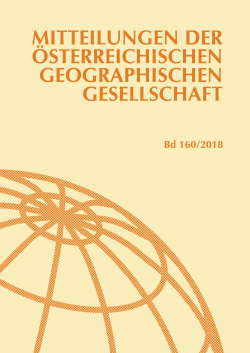Österreichische Geographische Gesellschaft
Mitteilungen der Österreichischen Geographischen Gesellschaft
Annals of the Austrian Geographical Society
Band 160 (Jahresband), Wien 2018
Volume 160 (Annual volume), Vienna 2018
Heike Egner,
Michael Jungmeier
S. 115 - 142
doi:
10.1553/moeg160s115
doi:
10.1553/moeg160s115
Abstract:
Protected areas are regarded as central instruments for the implementation of global nature conservation objectives and have been conceived to serve the purpose of conserving and safeguarding biodiversity. Most protected areas have been designated during the past decades and comply with strict territorial considerations: they have strong local roots and are very narrowly defined due to the negotiation processes involved in determining the demarcation, as well as the established administrative boundaries and precise zoning. This method is implicitly based on the assumption of the constancy and immutability of the natural and social environment of protected areas. The following article calls this into question and reveals that the territorial concept of protected areas appears difficult to sustain in light of the complex processes of a constantly changing environment on the one hand, and when viewed against the background of ever expanding nature conservation objectives, on the other hand. Furthermore, the contribution confronts essential underlying assumptions of nature conservation with complexity-theoretical considerations and illustrates that the basic assumptions pertaining to nature conservation require a fundamental revision, which would also have far-reaching consequences in practical conservation work. The considerations are presented within a framework provided by the thesis of the Anthropocene, which fundamentally challenges established dualisms such as nature/culture.
nature conservation, protected areas, non-territorial conservation, complexity, non-linearity, Anthropocene
Published Online:
2019/04/30 08:48:19
Object Identifier:
0xc1aa5576 0x003a9f97
Rights:All rights reserved.For questions regarding copyright and copies please contact us by email.
Die Fachzeitschrift "Mitteilungen der Österreichischen Geographischen Gesellschaft" (früher "Mitteilungen der k.k. Geographischen Gesellschaft in Wien")
• ist das wichtigste regelmäßig erscheinende Organ der "Österreichischen Geographischen Gesellschaft",
erscheint seit 1857 und ist die älteste noch existierende Fachzeitschrift geographischen Inhaltes im deutschen Sprachraum,
• vermittelt neue Erkenntnisse aus allen Bereichen der Geographie, Kartographie und verwandter Raumwissenschaften,
• informiert über Fachfragen in Forschung und Lehre, nationale und internationale geographische Aktivitäten, sowie Personalia,
• erscheint im Umfang von mindestens 400 Druckseiten (mit Kartenbeilagen) im Jahr


 Home
Home Print
Print
 References
References
 Share
Share
